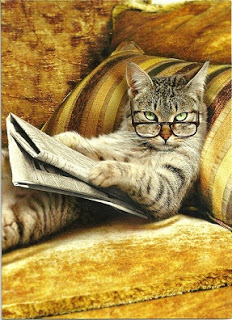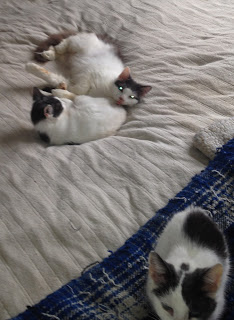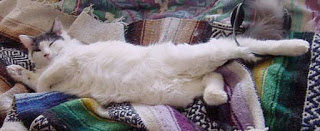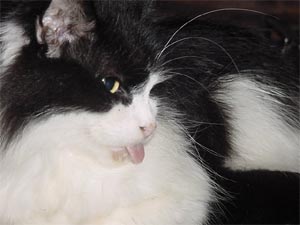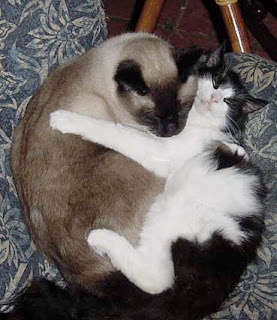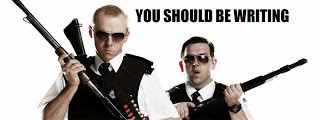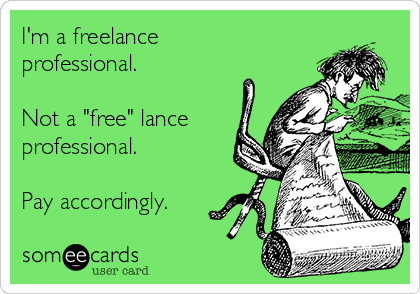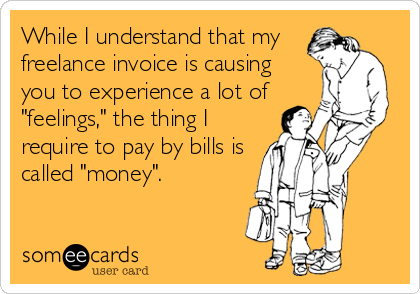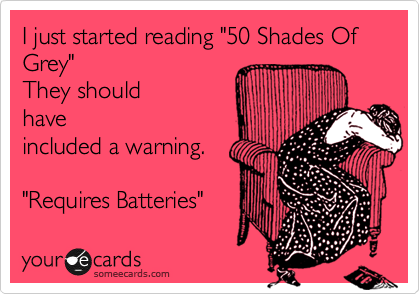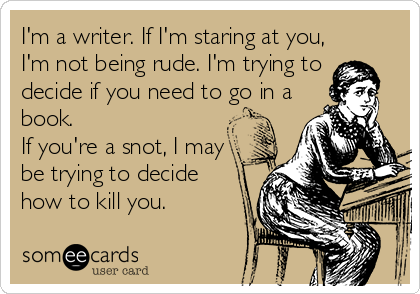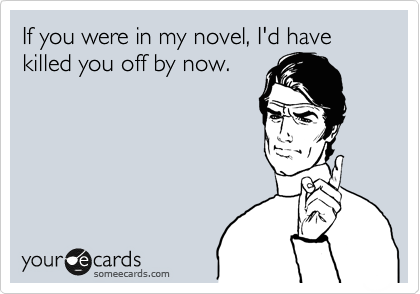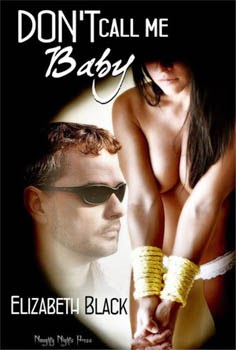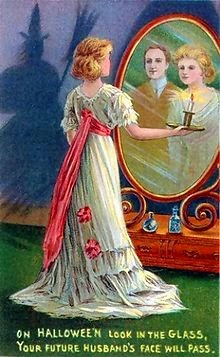Elizabeth Black
writes in a wide variety of genres including erotica, erotic romance, and dark
fiction. She lives on the Massachusetts coast with her husband, son, and three
cats. Visit her web site, her Facebook
page, and her Amazon Author Page.
My last few ERWA
posts have been quite serious, so I wanted to keep things light this month.
Writers often talk about their muses, including writers whose works have
inspired them. I’ve long been inspired by Shirley Jackson, Stephen King, Joe
Lansdale, Edgar Allan Poe, Dorothy Parker, and Oscar Wilde. Writers also talk
about the support they get from their family and friends. Some have a mentor or
two. I’m fortunate enough to have a great deal of support from my husband and
my writer friends, especially on Facebook. I know that plenty of writers are
shunned by their parents, siblings, and spouses who especially don’t take
erotic fiction seriously. They want to support the writers in their midst, but
they wish they wrote “real” books. I can’t count the number of times
I’ve been looked down upon because I erotic fiction and romance. The genres get
a lot of grief they don’t deserve, especially when it comes to romance. Romance
is the most successful genre out there. It deserves more respect.
I consider pets to
be an unusual muse. Our pets are part of our families, and they give us
unconditional love. We feed them and give then a safe place to live and they
repay us by doting on us, curling into our laps, and displaying cute behavior
that turns us into puddles of delighted goo. Cats and writers seem to go
together like, well, cats and writers. Probably the most famous literary cat
lover is Ernest Hemingway, whose polydactyl cats are the stuff of legend. Edgar
Allan Poe had trained the family cat to sleep on his wife Virginia’s chest to
keep her warm since she suffered from tuberculosis. Mark Twain said “Some
people scorn a cat and think it not an essential; but the Clemens tribe are not
of these.”
Joyce Carol Oates
described the soothing calm she feels from her cat. “I
write so much because my cat sits on my lap. She purrs so I don’t want to get
up. She’s so much more calming than my husband.” Science fiction writer
Philip K. Dick wrote the following of his cat, Willis: “Willis, my tomcat, strides silently
over the pages of that book, being important as he is, with his long golden
twitching tail. Make them understand, he says to me, that animals are really
that important right now. He says this, and then eats up all the food we had
been warming for our baby. Some cats are far too pushy. The next thing he’ll
want to do is write SF novels. I hope he does. None of them will sell.”
Neil
Gaiman, Ray Bradbury, and William S. Burroughs were owned by cats. T. S. Elliot loved cats so much he wrote
poems about them that were turned into an award-winning, long-running
musical.
I have
long been a cat lover, and their antics have inspired me so much I’ve included
some of my own in my fiction. Below is a picture of (from top to bottom)
Beowulf, Domino, and Scully. Domino is the matriarch. She was the first kitten
born to Oreo, whom I will talk about below. Yes, I have a cat named Scully. I
used to have a cat named Mulder but she died several years ago from kidney
failure. I like to tell people she was abducted by aliens.
My cats have
appeared in many of my stories. It’s my way of keeping them with me at all
times and making them immortal. Beowulf appeared in my short story The Party Crasher, which was published
by Scarlet Magazine in the U. K. It was one of my first published stories. One
of Beowulf’s nicknames was Mr. Fuzzyboy. Sadly, he died suddenly in January,
2015. I still miss him. This is Beowulf, showing off.
Here is the scene in
The Party Crasher when Beowulf made
his appearance. It’s Olivia’s birthday, and a man she’d been seeing (Fred) who
does not awaken her passions invited a medium to her surprise birthday party.
Madame Persephone quickly homes in on Jeremy, a friend of Olivia’s Olivia lusts
after. The resulting séance becomes quite comical.
The Party Crasher – Excerpt
Madame Persephone laced her thick
fingers together and looked around the room. She pointed to three guests,
including Fred, and asked them to take a seat at the table. She then asked
Olivia to take the seat next to her. That left one seat open.
She sniffed the air again. She
held out her hands, and her fingers danced on the air. She turned slowly, and
faced the kitchen.
“You, young man,” She
pointed to Jeremy. “I need you here. I have a strong feeling about you,
that you are especially sensitive.”
So Jeremy is “especially
sensitive” and Olivia is as thick as a rock. That made her feel just
wonderful. She doubted anything would happen during this silly séance, but she
couldn’t tell Fred to make the woman leave. Besides, the silliness could be
fun. At least the argument over Sir Paul’s divorce had finally subsided. Olivia
was afraid she was going to have to break it up, it got so heated.
“Sir –” Madame
Persephone pointed to Jeremy. “Please sit next to Olivia.” Fred
looked put out that he was not seated next to Olivia. He was between two of her
coworkers who were unable to stifle their giggling.
Madame Persephone lit the white
candles. She picked up the white sage incense, lit it, blew it out, and waved
the smoke around the table. She muttered some kind of prayer under her breath.
“We are ready,” she
said. “Someone please turn out the lights.”
One of the guests obliged. Olivia
let her eyes adjust to the dim light. Candlelight flickered on the table,
walls, and ceiling. Someone snickered in the quiet.
“All of us must be silent. I
will try to contact the spirits I sense lurking in this house. Everyone around
the table, please hold hands. Don’t break contact during the séance. That’s
very dangerous. You may trap a spirit here who doesn’t want to be here. I can’t
stress that enough.” Madame Persephone said. “Is everyone
ready?”
Olivia saw heads nod around the
table. A ripple flowed up her spine. She was a little excited about this
silliness after all. While she didn’t believe for a second that Madame
Persephone would contact any spirits, deep down she had hoped she would.
“I call to you, oh restless
spirits that may occupy this house. Speak to us,” Madame Persephone said.
She trembled, and lowered her head to her chest. She moaned. It was quite a
good show. The woman knew her stuff.
“Meeeeeeeeoooowwwww!!!!!”
Madame Persephone’s eyes bugged open. “Oh, now, Mr. Fuzzyboy, you behave
yourself.” She looked at Olivia. “My apologies. That was my spirit
guide, Mr. Fuzzyboy, making an ass of himself. He likes to show up at my
séances just to get noisy. He demands a lot of attention, and wants to talk
through me. He probably wants a treat.” Olivia realized that Mr. Fuzzyboy
sounded a lot like Fred, who was just as demanding and wanted treats for his
performances as well.
Madame Persephone closed her
eyes, and continued speaking. “Mr. Fuzzyboy, now is not the time. We can
play later.” She giggled. “Yes, I’ll get your catnip toy when I get
home.”
She rocked back and forth in her
chair, and hummed in a low voice. Glenda, one of Olivia’s coworkers, giggled.
Olivia heard someone kick Glenda under the table.
Madame Persephone bolted upright
in her chair, and stared at Olivia.
“My dear, there is someone
here who wants to speak to you.”
Olivia stared back. “Me?
Who?”
“It’s a man – definitely a
man, but he won’t tell me his name. He’s asking… what, sir?” She jerked in
her seat as if offended. “I most certainly will not ask her that, sir, not in mixed company.”
What on earth could this be about, Olivia wondered.
“How rude! Seriously, sir,
do you take me for a fool?”
“What does he want to ask
me?” Olivia asked.
“I can’t repeat what he
said. It’s… crude.”
“This sounds like fun,”
Jeremy said. Olivia pinched his hand.
“Say it anyway. I’m
curious.” Olivia insisted.
Madame Persephone squirmed in her
seat. “He wants to know if he can stick his finger in your bellybutton and
tickle you.”
Everyone laughed.
Olivia could do nothing but sit
there with her mouth hanging open. A flush rose from her chest and warmed her
face. She thanked God that in the candlelight, no one could see her blushing.
“You are ticklish in your
belly button, Olivia.”
“Shut up, Fred.” Olivia
said. To Madame Persephone, she said: “Please tell him I said ‘no.'”
“That’s what I thought you’d
say.” Madame Persephone was silent for a few seconds. “Sir, if she
won’t let you stick your finger in her belly button, I seriously doubt she
would let you do that.”
I don’t want to know, thought Olivia. Her heart jumped in her chest. She glanced
at Jeremy, who fought off laughter by biting his lower lip. Olivia felt
mortified.
Who the heck is that woman talking to?
Below is a picture of Lucky, our tuxedo cat. He’s about 12 years
old now and still acts like a kitten. He’s the most personable cat I’ve ever
met. He made a brief appearance in my short story The Wandering Cat.
Below is an excerpt
from my short erotic story The Wandering
Cat, which was originally published by eXcessica. It’s out of print now.
Oreo the cat is based on my late cat also named Oreo, who had a penchant for
clawing her way out of the house. She loved to wander around Rockport,
Massachusetts, where I live. She looked like Sylvester from the Loony Tunes cartoons.
The picture is of Oreo with her tongue sticking out, as it often did. I swear
that cat’s tongue was too big for her head. As you can see, Beowulf made an
appearance in this story, too. He got around. So did Lucky, who is also in the
story.
The Wandering Cat – Excerpt
“Oreo! It’s chow time!”
Cat refilled the cat food bowl and the water
bowl. Beowulf and Lucky ran to see their new chow, but Oreo was nowhere to be
seen. That was unlike her.
Worried, Cat turned the house upside down.
She looked behind the bed, in the closets, and under the couch. No cat. There
was only one other place where Oreo could be, and that was sitting on her
window bench.
The large Gothic window was open. No cat sat
on the plush window bench. Cat took a closer look at the window, and saw that
the screen had been clawed. There was a hole in the screen big enough for a cat
to climb through.
Great. Oreo got out again.
Cat put on her sandals and walked outside.
She saw cat paw prints in the damp earth, and followed them through her back
yard. They ended at the fence marking Lance Hendry’s back yard.
Her heart raced. Would Oreo give her an
excuse to say something to Lance other than “Hello, how’s the
weather?” She fantasized about his scrumptious body every night. What
would his arms feel like as they wrapped around her? She wished she could
summon up the courage to say more to him than a few quick words.
Oreo gave her that chance.
She walked into his back yard. Peter
Gabriel’s music played from somewhere inside, making Cat’s heart beat all the
faster. Not only was Lance home, he was another Peter Gabriel fan.
She knocked on the back door. Her fingers
sounded muffled against the hard wood. How could he hear her over the music?
After a minute of knocking on the door, she backed up.
A Gothic window was open on the second floor.
She hoped he was up there. She felt like the rebuttal to Rapunzel. The damsel
stood below the enchanted window, and wished her man would appear in it.
“Lance? Are you there?”
No answer.
“Lance!”
A head with rumpled hair and a broad set of
shoulders leaned out of the window. He wasn’t wearing a shirt. Cat took a good
look at his muscular chest and the black hair that covered it. She didn’t know
when she would get a gorgeous sight like that again.
“Hi. What’s up?”
“Have you seen my cat? Oreo? The little
black and white one?”
“The one that always gets out? No,
haven’t seen her.”
“Oh. Thanks.” She was too shy to
ask him any more questions. Muscle up
some courage, girl! Ask him how he’s doing. Something. Anything! Talk to him!
“Would you like some help looking for
her?”
“I’d love it!” Cat was so excited
over getting to spend some time with Lance that her knees knocked. What would
she say to him? For once in her life, she was speechless. Would she be able to
make enough small talk to keep him interested in her?
“Stay put. I’ll be down in a
minute.”
He came outside wearing a button-down
short-sleeved shirt, shorts, and sandals. His shock of black hair looked as if
he hadn’t combed it in several days. That was the new fashion for young men
these days. Cat was ten years Lance’s senior, but she didn’t care. Maybe today
she’s win on two counts – they’d find her cat, and she’d gain a lover.
“What’s your name again?”
“It’s Cat. Short for Catherine.”
“Cat is looking for her cat?”
She laughed. “Yes, she sure is.”
“How long has Oreo been missing?”
“I don’t know. She didn’t come when I
refilled the food bowl, and she clawed through the screen window again. I’m
scared. I hope she’s okay.”
“I’m sure she is. She gets out often
enough. Have you looked around outside yet?”
“I’m just starting now. Want to come
with me?” Please say yes! Please say
yes!
“I’d love to. I’ve wanted to get to know
you better anyway.”
Cat’s stomach did The Happy Dance. She felt
light-headed and giddy. Lance wants to
get to know me better! All thanks to Oreo.
Below is an excerpt
from my upcoming family saga/thriller novel Secrets
and Lies, which will be published by Eldritch Press in 2016. Kate Stanwood
is my main character. Her cat Koala is based on a Snowshoe cat that owned me,
also named Koala. Snowshoes are a mix between Siamese and domestic shorthairs.
They have white paws called “boots”, hence the name. Koala was so smart he was
scary. My husband Bill (at the time we were dating) used to live next door to
me. Sometimes Koala would sometimes get himself locked out of the house at night.
So, he’d go over to Bill’s house. Bill often stayed up late. Koala would meow
loudly until Bill came outside, and the cat would then run to my front door and
meow to be let in. Bill would let him
in, and all would be well in the world. Koala used to do the exact same thing
to me that he is doing to Kate at stupid o’clock in the morning. The picture is
of Koala on the left and Oreo on the right. They were inseparable.
Secrets and Lies – Excerpt
Meow!!!
Kate snapped awake. She always snapped awake
at the slightest sound. She was lying on her back. Koala stared at her from his
perch on the headboard, which was designed like a bookcase. She glared at him. He stared back and mewed.
I am
not getting up just to top off your food bowl, she thought. Koala meowed at her again. He
looked at her with that “Get up and feed me now”
expression on his cherubic little Snowshoe face. He stood and stretched. He
looked at all the books stacked in a pile next to him. The stack teetered precariously over Kate’s
head. She knew what was coming.
She slowly reached for the water bottle
behind her on the bookcase. Koala froze, one paw touching the spine of a thick
hardback that was already threatening to tip over onto her face. She held the
bottle between forefinger and thumb in full view of the cat. He knew what was
coming, too. As if that would stop the little furball.
You
knock that book over on my head, cat, and you’re Vietnamese food in a few
hours. Koala tapped the book. Kate shook the bottle.
The cat’s eyes widened. He jumped off of the headboard and landed between Kate
and Ian, who slept through it all. He always slept through the nighttime
follies. The bed could fall through the floor and he’d sleep through it.
Koala used Ian’s shoulders as a springboard
and vaulted off of the bed. Ian said “Oof!” and rolled onto his back.
The snoring started almost immediately. Kate sighed and pushed him onto his
side. His snoring rivaled the foghorn at the end of the Cove.
She glanced at the clock: 4:51 a.m. She was
wide awake. She hated it when she woke up too early, which had always been a
bad habit of hers. Thank God she didn’t have to go to work, even though it was
a Tuesday. She could sleep through late morning once she became tired again.
She rolled out of bed and walked into the
upstairs kitchen. Koala followed her, mewing at her ankles, until she picked up
his food bowl, shook it, and placed it back onto the floor. That cat hated
eating anything that he knew had another cat’s spit on it, so she shook the
bowl until fresher contents reached the surface. Satisfied, he ate with gusto.
What a pain in the butt, but she’d never give him up for anything.
I don’t know what I
would do if I didn’t have my cats to keep me company and inspire me while I
write. They’re so important to me they’ve become a part of my fiction. Do you
have pets that inspire you to write? Do you cater to your dogs, or are you
owned by cats? Do you have unusual animals around you, like Flannery O’Connor
and her peacocks? I believe animals make some of the best muses, and they don’t
ask for anything in return but attention, food, and a place to sleep (often on
you). They are the ultimate givers of unconditional love. I wouldn’t part with
my cats for anything in the world, and I’ve immortalized them in my fiction.
If you’d like to
read my erotic fiction, feel free to visit my Elizabeth Black Amazon
Author Page. If you’d like to take a look at my darker stuff, visit my E. A. Black Amazon Author Page.

